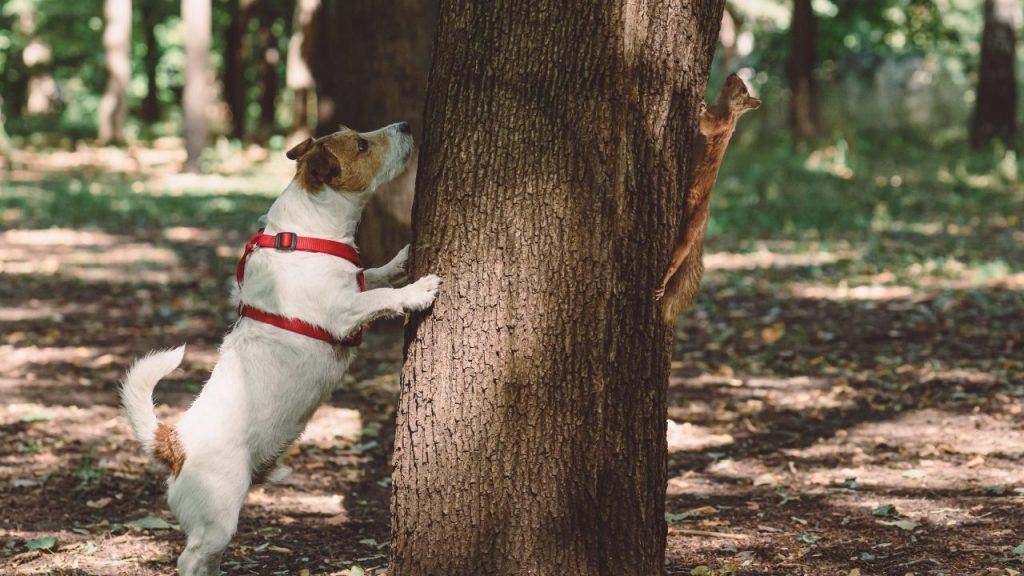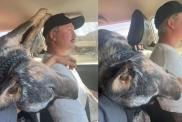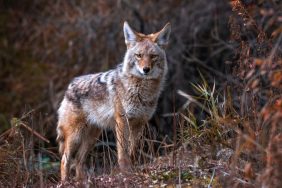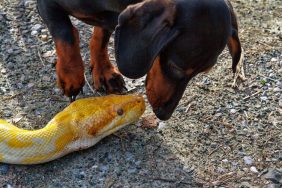Going for a walk with your dog is a great way to experience nature, but wild animal encounters can make nature dangerous. It’s important to know how to avoid wild animal attacks while walking your dog and what to do if an attack is unavoidable. If your dog is attacked while out on a walk, it’s best to seek emergency care from your veterinarian immediately.
Raccoons, opossums, and other small mammals
A smaller wild animal might not seem like a huge threat, but they can carry diseases and parasites that can seriously harm your dog. Many of these animals are nocturnal and will be more common during nighttime walks, though they can be active in the daytime. These animals are unlikely to attack unless they feel cornered or are protecting their young.
Floodlights or high-powered flashlights can be effective at scaring most nocturnal critters off. Loud noises and human voices also tend to frighten these animals. Keep your dog on leash, as many dogs have a prey drive and will attack, causing a wild animal to defend itself. Throwing something like a rock or stick may also frighten small animals away. If your dog is attacked, use a stick, shovel, rake, or whatever object is on hand to put in between your pup and the animal to break them up.
Snakes, spiders, and small, venomous creatures
Snakes, scorpions, and spiders are fairly common in desert areas, and their bites and stings can be harmful or deadly to your dog. If you live in an area where these critters are common, it’s a good idea to train your dog to avoid them. Stay on trails and avoid bushes, tall grass, or rocks that could provide shady areas where these creatures might hide.
If you encounter one of these venomous animals on your walk, do not make sudden movements. Back away slowly or take a wide circle around it to avoid disturbing the creature. Keep a firm grip on your dog’s leash and keep them as calm as possible.
Bees
Bees are usually found where you’d expect them, namely near flowers and plants, as well as water sources like pools or bird baths. It’s a good idea to avoid these on your walks. A normal honeybee is unlikely to sting unless its hive is disturbed; although, Africanized bees are more aggressive and tend to nest in places that European bees do not. Perfume, dark clothing, and jewelry can also attract bees.
If a swarm attacks you, run and find shelter immediately. Do not swat or crush bees, as they emit a scent that attracts more bees when they are killed. Running into the wind can slow them down and give you and your dog a chance to escape. Do not jump into water. Africanized bees will wait for you to come up for air and sting you again. The main thing to focus on is getting indoors and taking shelter. Once inside, remove any stingers that may still be in your skin or your dog’s skin and seek medical attention immediately.
Coyotes
Coyotes can be found almost anywhere as cities expand into their natural habitats and provide garbage as a food source. The best way to deal with a coyote that’s following you and your dog on a walk is to make a lot of noise. Yelling and shouting tends to frighten them, and they will most likely run off.
If a coyote does not immediately back down, keep eye contact. Do not run away. Hold a jacket or backpack over your head and make yourself look as big as possible. Slowly back away and move out of the area. If a coyote seems ready to attack, throw rocks, sticks, or anything on hand at it while yelling.
Bears
If you live in an area where bears are common, you should put bells on your dog’s collar and frequently make noises to avoid surprising animals. Walking through bear country makes bear spray a necessity, and you should always have it on you.
If you do happen to see a bear on your walk, quickly and quietly leave the area without running. Bears can run at 30 miles per hour and will easily catch you. The type of bear can also affect your encounter. Black bears may be more likely to try to avoid you, while grizzlies are less likely to try and run away.
If the bear has seen you, avoid sudden movements and keep your dog calm as you head in the opposite direction. If the bear’s behavior changes, speak in a low, calm voice to let it know you are human and move your arms. Should your encounter be at closer range, stand tall and make yourself look as big as possible while speaking in an assertive tone and backing away.
If the bear moves towards you, wave your arms and make noise. You can try throwing an object on the ground — as the bear may investigate and give you time to get away — but never throw food.
Should you and your dog be attacked, your best chance is to have bear spray at the ready. Spray it at their nose, eyes, and face. Grizzlies may leave you alone if you play dead, but your dog is unlikely to play along. If you are attacked by a black bear, fight back and be as loud as possible.
Mountain lions or wild cats
Mountain lions can be found in many parts of the United States, and many of those places have hiking trails where you may be walking your dog. Making noise is important in these areas, as most cougars will be scared off rather than face a confrontation. Bells on your dog’s collar can help, along with you making frequent yells or other loud sounds.
If you see a wild cat, give it space to retreat. Do not run, and, if possible, hold your dog so they do not run. Running can trigger a cat’s instinct to treat you as prey. Stand tall and make yourself look big by raising your arms or holding a jacket or backpack over your head. Talk loudly and firmly, and do not make eye contact as this can be seen as a challenge.
Keeping animal sprays or a weapon on you is a good idea if you’re on a remote hiking trail and are attacked. If you do not have a weapon, use sticks, rocks, or whatever is on hand. Bear spray can also be effective. An attacking mountain lion has already decided that it will risk injury to eat you or your dog, and fighting back is your best chance at survival.
Alligators
Alligators are a common wild animal in wetland areas and often prey on smaller animals like pets for a meal. If you’re walking your dog in an area where alligators are known to live, keep your dog on a short leash. Stay at least 25 feet from the edge of any body of water, including ponds, man-made reservoirs, rivers, and lakes. You should also be wary of paths that go between two water sources. Alligators can be moving over land between these areas.
Alligator attacks are rare, but in mating season from May to June, they become more aggressive. They are also more likely to attack if they have a nest nearby. If an alligator charges at you or your dog, run. Alligators mostly hunt with short bursts of speed near the edge of the water. Having a weapon or pepper spray may help during an alligator attack, but it’s best to avoid the water.
Moose
Moose see dogs as a threat and are often surprised when they bark or chase. Some of them will go out of their way to kick at dogs. It’s important to give them a wide berth so as not to disturb them. Keep your dog close so they don’t try to approach the moose.
During September and October, bull moose may be more aggressive, as this is mating season. In spring, the females may be more ready to attack to protect their young. You should move back and try to find anything that you and your dog can duck behind to get out of view. A tree, a car, a building, or anything large enough to keep you out of sight will do. If a moose charges, run. They usually don’t chase for long. Again, find something to duck behind to get out of sight.
What to do if your dog is attacked
If your dog is attacked by a wild animal, it’s best to seek emergency care right away. You can also contact the Pet Poison Helpline in the event your dog is bitten or stung. Looking for more pet safety tips? Learn about important first-aid items to keep on hand. Or, check out these additional safety tips when walking your dog.









